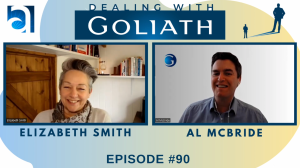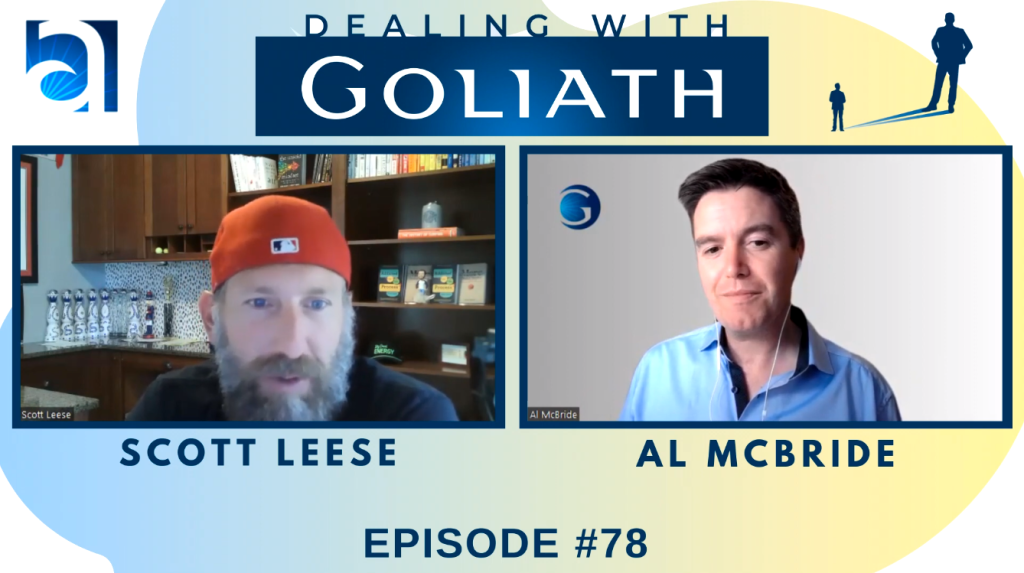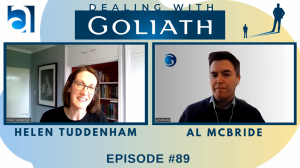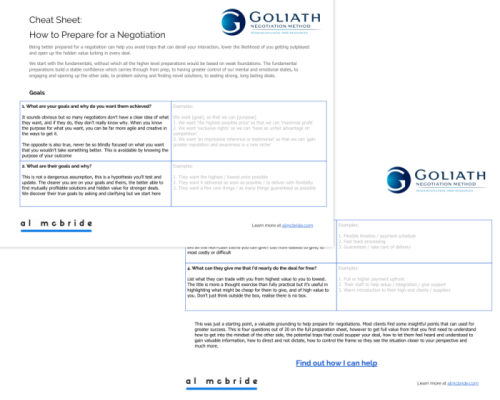

Chaos to Clarity: Scale through Profitable Partnerships with Scott Leese #078
Show Notes:
Are you tired of the chaos in your sales strategy? Do you find yourself struggling to scale your business? Welcome to the latest episode of the Dealing with Goliath podcast, where we unravel the mysteries of negotiation, ethical influence, and impactful conversations for business leaders seeking to thrive under pressure.
I’m your host, Al McBride, and today’s guest is a true sales powerhouse: Scott Leese. With a remarkable track record of six times sales leader, four times founder, and three-time author, Scott is your go-to consultant for transforming chaos into streamlined success. His consultancy, founded in 2016, focuses on scaling companies from zero to $25 million in annual recurring revenue.
Scott guides founders and leaders in crafting scalable, efficient, and profitable sales organizations. His philosophy? He’s not here to do everything for you. He’s here to empower you with the skills and knowledge to become self-sufficient and avoid the need for external help in the long run.
In this episode, Scott shares invaluable insights about identifying your ideal client, avoiding common mistakes in sales, and crafting an executive partnership that drives success. He emphasizes the power of clarity in your ideal customer profile and the significance of asking the right questions to build rapport and trust. Scott’s approach goes beyond conventional consultancy; it’s about fostering true collaboration and learning.
Ready to unlock your sales potential? Tune in to this episode to gain a fresh perspective on transforming your sales chaos into a scalable, successful venture. Don’t miss out—listen now and take the first step towards redefining your sales journey!
Guest Bio:
Scott Leese Consulting was founded in 2016 with a focus on companies scaling from $0 – $25m Annual Recurring Revenue. He works with both domestic and international companies on sales strategy, playbook creation, rev ops processes, recruiting, and coaching/training, and more. He teaches founders and leaders how to build scalable and successful sales organisations.
Scott has spent the better part of the last decade building communities that provide people with a safe space to learn, grow, and develop their skills.
He’s authored two Amazon #1 best-selling books: “Addicted to the Process”, and “More Than a Number” and has co-authored “From Rep to Manager” [2021] with Ryan Walker.
“If you want somebody to do everything for you — I’m not your guy. If you want someone to teach you how to fish so you can do this yourself and never have to hire somebody like me again: I’m your guy”.
Topics explored:
- Scott Leese shares insights to scale businesses from zero to $25M in annual recurring revenue.
- Scott’s approach to Executive Partnerships, where knowledge-sharing trumps one-sided solutions.
- Uncover the power of a focused ideal client profile for efficient sales and accelerated growth.
- The art of asking the right, impactful questions to build rapport and trust, fostering successful negotiations.
- Sales without overt selling, prioritizing rapport and deep understanding.
- Scott’s unique Surf and Sales Summit—a blend of micro sales conference and surfing adventure.
- Elevate your business by prioritizing business retention and nurturing long-term relationships.
- Scott uncovers hidden gems within organizations, ready to be leveraged for maximum impact.
Transcript
Al McBride 0:00
Yeah. Welcome to the dealing with Goliath podcast. The mission of dealing with Goliath is to sharpen the psychological edge in negotiation, ethical influencing and high impact conversations for business leaders who want to be more effective under pressure, uncover hidden value and build greater connection all while increasing profitability. This is the short form espresso shot of insight podcast interview to boost business performance using our five questions in around about 15 minutes for I say 50. But we often go way over, but we’ll see how we go.
My guest today is Scott Leese, to put in one short sentence six times sales leader four times founder three time author. But to expand on slightly further Scott Lee’s consulting was Fred founded in 2016, with a focus on company scaling from zero to $25 million annual recurring revenue. He works with both domestic and international companies on sales strategy, labor creation, Reb, ops, processes, recruiting, as well as coaching and training and more. He teaches founders and leaders how to build scalable and successful sales organizations.
Scott has spent the better part of the last decade building communities that provide people with a safe space to learn, grow and develop their skills. And he’s also the authored two number one Amazon best selling books, addicted to the process and more than a number, and has recently co authored from rep to manager at Ryan Walker. One of the reasons I really by the way, Scott, the last thing I’d throw in there, I really loved on your website. I think this sums up a lot about Scott, maybe if you Scott says if you want somebody to do everything for you, I’m not your guy, if he wants someone to teach you how to fish, so you can do this yourself and never have to hire somebody like me again. I am your guy. Scott, welcome to the show.
Scott Leese 1:57
Oh, thanks for having me. I appreciate it. This is that was a
Al McBride 2:00
great sentence. That was I think it speaks volumes about your approach and and why people value so much so. So let’s dive straight in. So who’s your ideal client? And what’s the biggest challenges they tend to face?
Scott Leese 2:14
Well, I’d be applying for me as is somebody who’s sort of at the series, a series B level, they’ve done some selling, they maybe have a couple salespeople. But now they need to turn it into like a scalable and repeatable process. And it’s not something that they’ve done before, or at least done successfully before. And my ideal partner and client to work with is somebody who wants to learn how to do this. That’s why I have that quote on the website. I’m not really interested, if you come to me and say, Hey, I just want you to, you know, build all these things for me do all this, I’m just going to be over here focusing on something else. I’m not really keen to do that.
What I want is an active partner, somebody that I can show why we’re going to build things the way we are, here’s how we’re going to build this go to market strategy. Here’s all the things that need to be in a sales playbook. And here’s why we’re building the operational process things this way. That way, one time, not there. They understand the logic behind it. They participated in building it in Arkansas architecting it that way, they’re, you know, more invested to keep it going. And now they know how to do things moving forward. And like I said, maybe you don’t need to hire somebody next time.
Al McBride 3:37
That’s fantastic. I mean, there’s there’s a lot going on there. And in a sense of you know, what, what got you here won’t get you there, as you said there needing to expand that skill set, which sounds fascinating. But it’s, as you said, was more interesting that you want that particular type of person who actually wants to learn that the why as well as the hat, who want to actually get in there will roll the sleeves up with you. Does that mean you have tend to have quite a more of what would you say it an alliance or a mentor ship almost relationship rather than kind of a top down? Consultant third party exterior type? Yeah,
Scott Leese 4:14
I would call it an executive partnership. Right? You know, a lot of early stage founders do not have the muscle of building and scaling sales orgs. And a lot of them have never even been a salesperson. Right? And so they have a lot of ideas about why things should be this way and why they shouldn’t be this other way. And, you know, it’s nice to have somebody who has been at an executive level for a long time who has done these things and this mission that you’re trying to do, and you can spar with and bounce ideas off of, you know, sometimes I might support an idea. Sometimes I might say, well, that could work. But here’s the downside of that. Here’s the upside.
Here’s the downside. Other times. I’m going They say, that’s a total shit idea. And here’s why you shouldn’t do that. And I’m going to prevent you from making a colossal mistake. So I call him an executive, you know, C level kind of partnership. That’s, like I said, a part of what you’re trying to do as you’re trying to optimize for your ideal customer profile. Right? That means getting rid of people who are not a good fit for you. And, you know, some of what I’m trying to do is just that,
Al McBride 5:30
absolutely, I love the polarizing. You know, as you said, if you want this, I’m not for you, if you want that sort of a relationship and direction, totally for you. So, so when we’re thinking of these people, if some of the listeners out there might find themselves in some of the overlap in the Venn diagram, what are some of the common mistakes people make? Maybe before they find you? So what sort of if they are trying to do it themselves? Are they getting in some sales reps? And we want to put in some of the errors that they’re making, that they’re feeling the pain, it’s not working, then they they find out?
Scott Leese 6:03
Well, I mean, there’s 1,000,001 things wrong. Where do I start? They try to sell to everybody all at once. So they don’t have a narrow enough ideal customer profile, right? One, they do not really understand their buyer persona. And so the things that they think are cool about their product, are not actually what the buyers care about, nor the pains that they solve. I’ve seen people over index for hiring salespeople with a particular industries expertise. So for example, let’s say we were building recruiting, or excuse me, real estate software of some kind, right?
Well, rather than hiring software salespeople, they hire ex real estate agents, something like this. All right, I’ve seen people hire a very expensive VP of Sales early on, who has no interest in being an individual contributor, and actually like selling the product, and wants to kind of be a VP of spreadsheets, and just strategize all day long. But the biggest killer is nobody puts together the actual process and playbook for what works. So even if a founder had some success, didn’t document anything. So now you try to go and scale.
And there’s no way for you to transfer your knowledge to whoever these people are that you’ve brought on board. What am I supposed to say when I’m on the phone? Right? How do I handle these particular objections? Who exactly am I supposed to sell to? What’s my perfect client? What are the tools that we use? What process should we be using, and it’s just chaos, right? And you can survive in a chaotic kind of wild, wild west environment up to a point.
But if you’re trying to build a business, that’s going to 20 million, 50 million 100 million, you can’t have the wild wild west out there. Right. And I’m a big believer in setting things up for scale, right away, rather than wild, wild west, doing it for years, and then having all of this sort of technical debt, if you will. And now we have to go back and put all this process in place. So those are some of the common errors that I’ve that I’ve seen. It’s fantastic.
Al McBride 8:35
And there’s a few points just to mention to the listeners. So we’re Excellent. Both the mix of weather, and I find this myself, whether you’re working with an executive or business owner, so often they don’t have they think they don’t have time to reflect what’s worked, what hasn’t. So as you say, they’re not nevermind not learning from the mistakes. They’re not learning from their victories, either. They have an isolated one.
Yeah. And then as you said, they’re not right in the SOP. So the people it might be in some way. copyable and then improvable. further from there. So structure earlier on excellent stuff. Excellent stuff. So what is one valuable free action that the audience might take it that they could implement that will help them with that issue? So it might not solve the problem, but at the very least we’ll have them facing the more helpful direction.
Scott Leese 9:25
I would try to get real clarity around who is your ideal customer profile right now? Right? I don’t mean, forever over the long arc of the company’s existence. I’m talking about right now. Who can we reach out to right now to get into conversations the fastest to potentially win deals sooner, so we can get some momentum so we can get people using the product, breaking the product pushing us to innovate all of this kind of thing. You know, if you’ve got a product and you can kind of sell to everybody, you’re really selling to nobody right now.
You can’t call real estate on one call insurance on the next lawyers on the next developers on the next and have any kind of get in any kind of rhythm with it all. So I just kind of encouraged people to look for some low hanging fruit initially. And this is where you get the practice and the repetition, you start to learn about the buyer persona, and what makes them tick, and what things they really care about, and why this person didn’t buy. And I’m hearing this as a theme consistently, why these people are taking meetings and are buying and learning about that as a theme. It’s like, I want to master one thing, one domain, before I try to expand over to the next. That’s probably the one of the very first things that I sit with people and talk about is like, Okay, well, who are we selling to here? As a lot of people, let’s shrink it down, can we get a hold of the fastest, right? That will really helps.
Al McBride 11:09
And that’s an interesting one, as as a, as an editing tool is Who can we get ahold of the fastest? Is that usually because you have access? Or is it usually because they have Perry Marshall says more of a bleeding neck, you know, they have more of a pain point that you can address?
Scott Leese 11:25
I would say more of access, right? Because even if I’m trying to go after people that have this bleeding neck, as you call it, if if I can’t reach them, how am I supposed to help them? Sure. Right. So this is an exaggerated example. But you know, there’s, there’s some industries and business owners that you can call that pick up the phone, and pick up their mobile all the time, like real estate agents, contractors, people like this, those people are a lot easier to get a hold of than somebody who’s in the C suite, at a technology company, or even a doctor who has people at the front desk, who are fielding phone calls that can’t make certain decisions.
So even if, if my software can serve all of these people, I might start off in the place, or where can I get into conversations quicker. And there’s a lot of learning that has to happen. There’s a lot of failing that has to happen in taking your your big swings early on with some of your potentially best clients one day is not necessarily the right move.
Al McBride 12:38
Very, very interesting points. As you said, as I go through that learning curve, you need to actually have to have those feedback loops of interaction and getting that piece of information in good reactions or or otherwise. Absolutely, absolutely. So what is one valuable free resource that you could direct some of our listeners or viewers to that will help them along this path?
Scott Leese 13:05
Well, I mean, most podcasts are free resources, whether it’s this one, or my podcast and surfing sales podcast, or the 1000s that are out there. People should take advantage of that. There’s also a lot of communities that are free, where you have the opportunity to network with people get their support, you know, get their ideas, help with deal flow, help find jobs, all this kind of thing. And then a lot of them are free or inexpensive. Right? That’s, that’s that’s where I would start, I suppose. And tell
Al McBride 13:45
us a little bit further about your sales and surfing surfing sales podcast. Yeah, it’s,
Scott Leese 13:51
it’s called the surfing sales Summit. And I started it in 2017. It’s a micro sales conference, we spend half the day talking about sales and leadership and entrepreneurship and things like that. And we spend the second half of the day surfing for an 80% of people who come have never surfed before. So we get surf instructors to come in and teach people how to surf and we eat good food and have drinks and just enjoy you know, nature and being out of our comfort zone. And so about three times a year, three times a year, I take 20 people down to Costa Rica from all over the world. We’ve had people from the UK, Switzerland, Australia, Canada, as well as the US so it’s a good time.
Al McBride 14:36
Excellent excuse to go to Costa Rica.
Scott Leese 14:39
Yeah, exactly is you know, it’s part learning opportunity and in business expense and part vacation and good time.
Al McBride 14:48
That’s telling that’s telling. So what might be your final question. So what might be your number one insight or principle you could offer to people on how to negotiate or build rapport or connection, or uncover some hidden value with clients, or counterparts?
Scott Leese 15:07
Well, I think that this just goes to asking the right questions, the better you are at asking questions, the right questions at the right time. And then shutting up and listening and really absorbing, you know, what’s going on with your, with your prospect that helps build some trust, you use the word rapport, that you know, trust rapport, where you feel like, okay, I might be able to help owl might be able to help me like, we’re on the same page here. And those things tend to make negotiation go a lot smoother.
You know, it could I really enjoy if I really enjoy talking to somebody, I feel good about working with them. You know, they might come to me and say, Hey, I’d love to work with you. Like, I know, I know you are, your cost is x, but I can only afford why. I might say yes, I just did this two weeks ago. You know, I told somebody, you know, my rates and they took a couple of days and came back and they said, Listen, we want to make this work. This is only budget that we have, like what I understand it’s not your normal rate. And I said you know what, fuck it, let’s do it. Right? Because I felt like I can make an impact and I felt they feel like I can can make an impact. And sometimes it’s it’s just about working with the right people and getting to good outcomes more than it is maximizing every dollar you know that you can be can so
Al McBride 16:44
I couldn’t agree more and beautifully verse. Thank you, Scott. Scott, where can people find out more about you? Where can they reach out to you?
Scott Leese 16:51
easiest place to reach out to me is via LinkedIn, I reply to every DM that I get on there. You can check out surf and sales.com for the sales conference and the podcast that I was talking about
Al McBride 17:07
sounding stuff and you have your main hub website, of course, which is Scott Lee’s consulting.com That’s SEO TT l e s e consulting.com. So it’s sounding stuff. Scott, thank you so much for being on the show.
Scott Leese 17:22
You’re welcome. Appreciate it.
Transcribed by https://otter.ai
Resources
🌐 Visit Scott’s consulting hub: https://scottleeseconsulting.com
🏄 Explore the Surf and Sales Summit: https://surfandsales.com
Surf and Sales Podcast on Spotify
Scott’s Untethered Blueprint: https://www.thescottleese.com/the-untethered-blueprint
Connect with Scott Leese:
🔗 Connect with Scott on LinkedIn: https://www.linkedin.com/in/scottleese
Ready for more:
If you’re interested in more, visit almcbride.com/minicourse for a free email minicourse on how to gain the psychological edge in your negotiations and critical conversations along with a helpful negotiation prep cheat sheet.
- TAGS: build, buyer persona, call, founder, hire, ideal customer profile, ideas, learning, people, podcast, process, product, sales, salespeople, scott, scott leese


